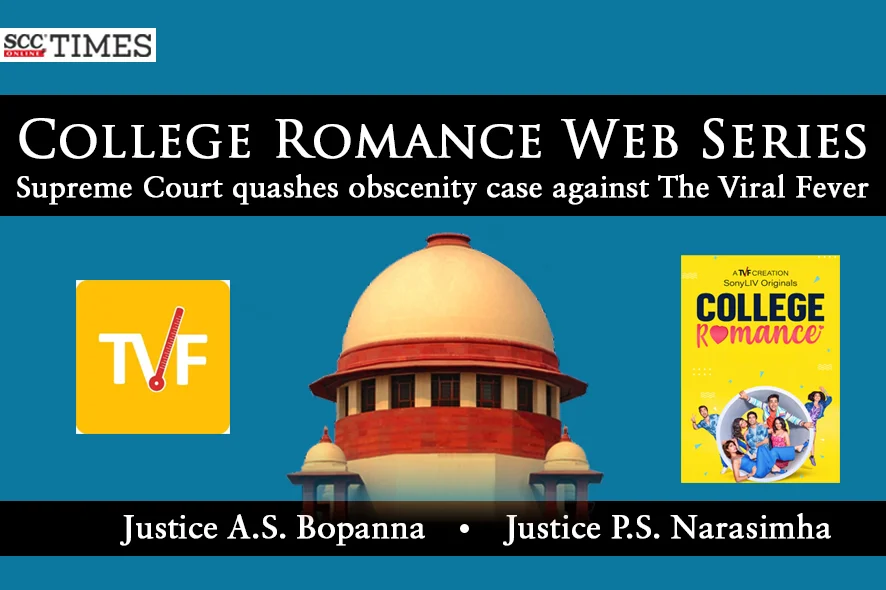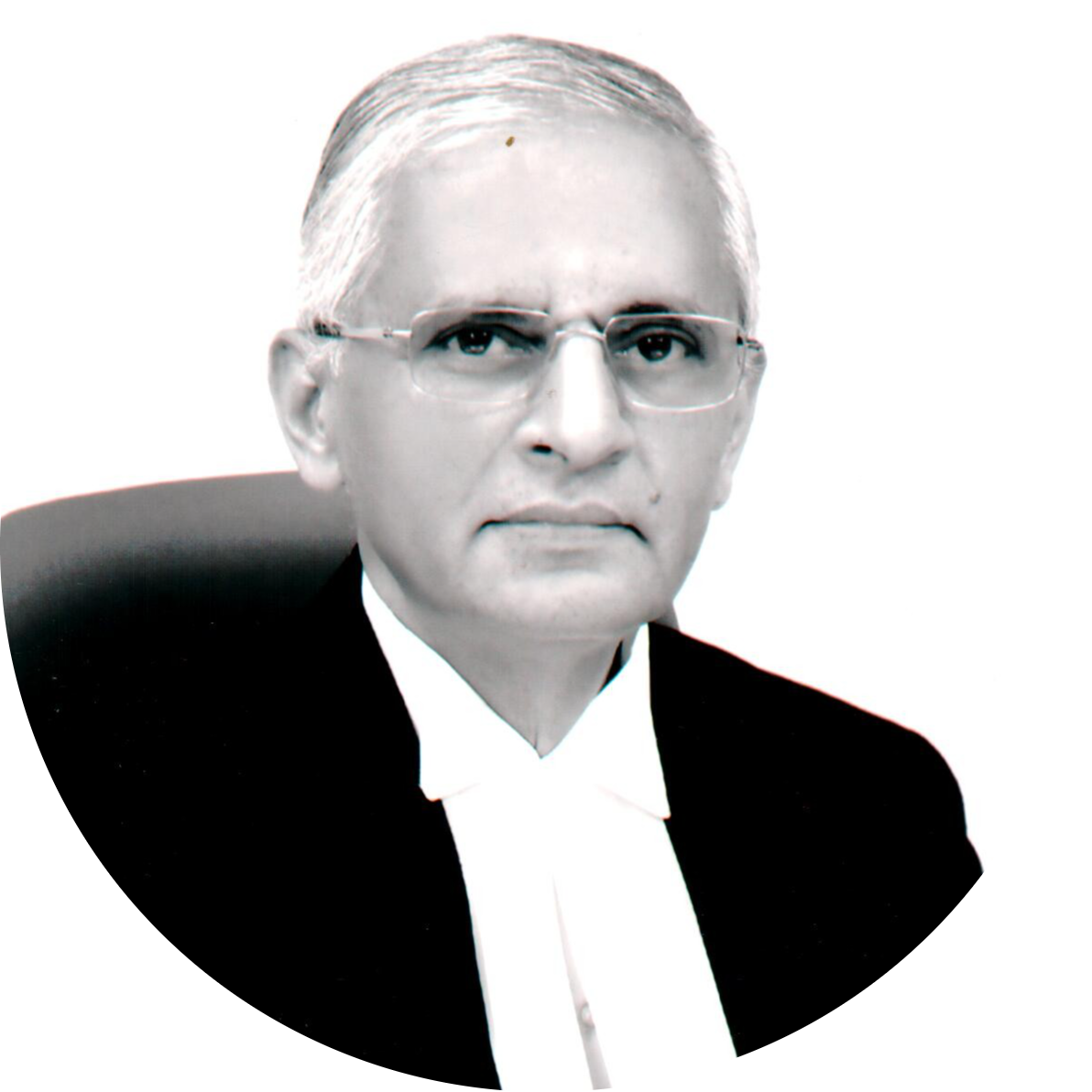Supreme Court: In appeals against Delhi High Court’s dismissal to quash orders of investigation and prosecution for production, transmission, and online publication of obscene and sexually-explicit material under Sections 67 and 67-A of the Information Technology Act, 2000 (‘IT Act’) against the makers of web-series ‘College Romance’ (TVF Media Labs Private Ltd.), the Division Bench of AS Bopanna and Pamidighantam Sri Narasimha, JJ. quashed the criminal case against the makers of ‘College Romance’.
Factual Background
The appellants in the instant matter were the actors, casting director, script writers, creator of ‘College Romance’ and the media company owning the YouTube channel which hosted the web-series. The instant matter pertained to the complaint filed before the Assistant Commissioner of Police stating that Episode 5 Season 1 of the said web series titled ‘Happily F****d Up’, contained vulgar and obscene language, constituting offence under Sections 292, 294 and 509 of the Penal Code, 1860 (‘IPC’), Sections 67 and 67-A of the IT Act and Sections 2(c) and 3 of the Indecent Representation of Women (Prohibition) Act, 1986. Later, Investigating Officer denied cognizable offence in the absence of obscenity, but the ACMM directed registration of First Information Report (‘FIR’) under Sections 292 and 294 of the IPC and Sections 67 and 67-A of the IT Act with the explanation that “vulgar language used is prima facie capable of appealing to prurient interests of the audience and is hence obscene”. Revision petition led the Additional Sessions Judge to modify the order directing FIR only under Sections 67 and 67-A of the IT Act.
Petition under Section 482 seeking to quash the said orders got dismissed by the Delhi High Court and consequent directions were issued for registration of FIR under Sections 67 and 67-A of the IT Act, which was impugned hereunder. An FIR was accordingly registered on 16-04-2023.
Court’s Analysis
The Court perused the High Court’s explanation and concluded that the issue to be determined was whether use of expletives and profane language in the titles and content of ‘College Romance’ constituted an offence of publication and transmission of obscene and sexually explicit content under Sections 67 and 67-A of the IT Act. The Court went on to examine the provisions in context of ‘obscenity’ and ‘sexually explicit material’.
The Court touched upon constitutionally upheld Section 292 of IPC through Ranjit D. Udeshi v. State of Maharashtra, 1964 SCC OnLine SC 52, Hicklin Test, sex, nudity, public decency and morality, and the likeliness to pander to lascivious, prurient, sexually precocious minds, and appeal to or have the tendency to appeal to the “carnal side of human nature” for explaining obscenity. The concept was refined in Chandrakant Kalyandas Kakodkar v. State of Maharashtra, (1969) 2 SCC 687 and a catena of cases throwing light upon sex and nudity in art and literature.
The Court hinted that the High Court purportedly applied the community standard test as laid down in Aveek Sarkar v. State of W.B., (2014) 4 SCC 257, and also appreciated the position of law for standard determination of ‘obscene’. The Court highlighted the incorrectly framed question for inquiry by the High Court and pointed towards the natural arrival at a wrong answer, for equating profanities and vulgarity with obscenity, without analyzing in detail how such language by itself could be sexual, lascivious, prurient, or depraving and corrupting. It explained that “the enquiry under Section 292 of the IPC or under Section 67 of the IT Act does not hinge on whether the language or words are decent, or whether they are commonly used in the country. Rather, from the plain language of the provision, the inquiry is to determine whether the content is lascivious, appeals to prurient interests, or tends to deprave and corrupt the minds of those in whose hands it is likely to fall.”
The Court went on to explain that “While the literal meaning of the terms used may be sexual in nature and they may refer to sexual acts, their usage does not arouse sexual feelings or lust in any viewer of ordinary prudence and common sense. Rather, the common usage of these words is reflective of emotions of anger, rage, frustration, grief, or perhaps excitement…. When we notice the use of such language in the context of the plot and theme of the web-series, which is a light-hearted show on the college lives of young students, it is clear that the use of these terms is not related to sex and does not have any sexual connotation.”
While clarifying that the standard for determining obscenity could not be that of an adolescent’s or child’s mind, the Court hinted towards the High Court which ‘incorrectly used the standard of “impressionable minds”.’ For the web series not being classified as restricted to those above the age of 18 years, as pointed out by the High Court, the Court commented that “While such anxiety is not misplaced, the availability of content that contains profanities and swear words cannot be regulated by criminalizing it as obscene.” It further hinted at the lack of offence made out under Section 67A as per High Court’s remarks.
Therefore, the Court allowed instant appeals and set aside the impugned judgment and FIR under Sections 67 and 67-A of IT Act.
CASE DETAILS
2024 SCC OnLine SC 325 Apoorva Arora State (NCT of Delhi) |
Advocates who appeared in this case For Petitioners: For Petitioners: |
CORAM :










